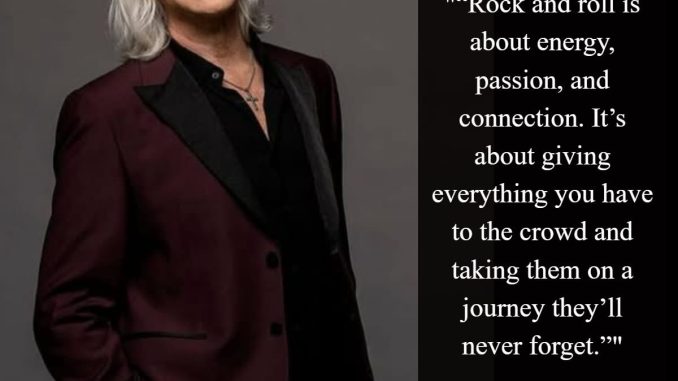
Few frontmen embody the heart, grit, and survival instincts of rock and roll like Joe Elliott. Born on August 1, 1959, in Sheffield, England, Elliott rose from working-class roots to become the lead vocalist of Def Leppard, one of the most influential and commercially successful bands of the 1980s. His unmistakable voice, charismatic stage presence, and unyielding leadership helped carve a permanent place for the band in music history.
Def Leppard’s story is one of triumph, tragedy, and sheer perseverance. At its center has always been Joe Elliott—part showman, part motivator, and part glue holding the band together through turbulent decades.
Defining a Sound in the 1980s
By the early 1980s, rock was in the middle of an evolution. British hard rock was colliding with glam, punk, and the burgeoning sound of arena-ready anthems. Into this landscape stepped Def Leppard, with Elliott front and center.
The band’s third album, Pyromania (1983), was a turning point. Powered by hits like “Photograph” and “Rock of Ages,” it propelled them into the global spotlight. Elliott’s soaring vocals, simultaneously gritty and melodic, became the defining element of their sound. His ability to command both delicate ballads and stadium-shaking anthems allowed Def Leppard to stand apart from peers who leaned either too heavy or too soft.
The momentum reached a fever pitch with Hysteria (1987). Packed with seven hit singles—including “Pour Some Sugar on Me,” “Love Bites,” and “Armageddon It”—the album sold over 20 million copies worldwide. It wasn’t just a commercial triumph; it was a cultural moment. Elliott’s voice blared from car radios, MTV screens, and stadium speakers across the globe, cementing him as one of rock’s most iconic vocalists.
Leading Through Adversity
But Def Leppard’s path to superstardom was far from smooth. In 1984, drummer Rick Allen lost his left arm in a car accident, a tragedy that could have ended the band. Instead, with Elliott’s unwavering support and the group’s collective determination, Allen learned to play a specially adapted electronic drum kit.
Elliott’s role was crucial during this period. His loyalty to Allen, refusing to replace him and insisting that Def Leppard would carry on together, became a symbol of resilience in rock history. The decision paid off: Allen returned stronger than ever, and Hysteria became their defining work.
That spirit of endurance carried into the 1990s, when the band battled shifting musical landscapes, grunge’s dominance, and personal challenges. Elliott’s leadership and dedication to keeping the band’s identity intact helped Def Leppard weather storms that saw many contemporaries fade away.
Beyond Def Leppard
Though Def Leppard has always been his main vessel, Joe Elliott has never been afraid to stretch his creative muscles. His side project Down ’n’ Outz, formed in 2009, allowed him to pay tribute to his love for 1970s glam rock. With covers of songs by Mott the Hoople, Ian Hunter, and other influences, Elliott displayed a different facet of his artistry—less bombastic, more intimate, yet still full of passion.
The project also reminded fans of Elliott’s encyclopedic knowledge of rock history and his genuine love for the genre. For him, music has always been about more than chart success; it is about community, legacy, and keeping the flame of rock alive for new generations.
Rock & Roll Hall of Fame Recognition
In 2019, Def Leppard was inducted into the Rock & Roll Hall of Fame, an honor that validated decades of perseverance. When Elliott took the stage during the ceremony, he reflected not just on the band’s achievements but on their journey—the hardships, the triumphs, and the enduring bond between bandmates and fans.
For millions around the world, that induction wasn’t just about Def Leppard. It was about the spirit of rock resilience that Elliott has championed his entire career.
A Voice That Endures
Even today, Elliott continues to tour with Def Leppard, sharing stages with fellow rock legends and selling out arenas across continents. His voice—though weathered by years of performing—remains powerful, still capable of igniting crowds with the same energy that defined the band in the 1980s.
But perhaps more than his vocal ability, it is Elliott’s dedication that stands out. In an industry notorious for burnouts and implosions, he has steered Def Leppard with loyalty, vision, and an undying belief in the power of rock music.
Conclusion
Joe Elliott’s legacy is inseparable from Def Leppard’s meteoric rise and enduring presence. From the chart-topping highs of Pyromania and Hysteria to the low points of personal tragedy and changing musical climates, Elliott has been the voice and spirit guiding the band through it all.
Inducted into the Rock & Roll Hall of Fame, celebrated across generations, and still performing to this day, Elliott remains a symbol of rock and roll’s resilience. He is not just the singer of Def Leppard; he is the embodiment of what the genre represents—community, perseverance, and the electrifying energy of music that refuses to die.
Would you like me to frame this more like a career retrospective profile (magazine-style, reflective), or as a breaking news anniversary piece (e.g., tied to his birthday or a milestone)?
Leave a Reply